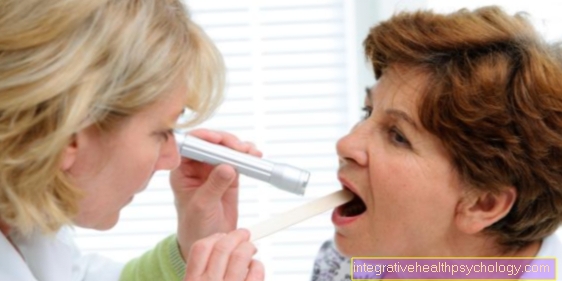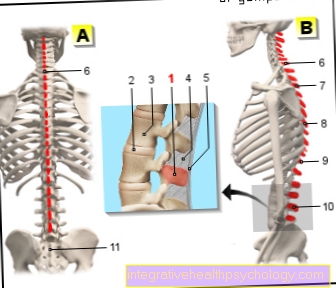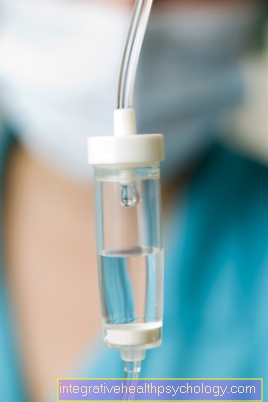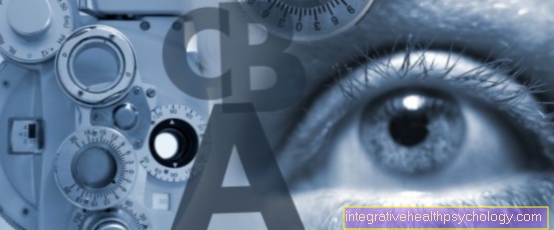Antibiotics for pneumonia
introduction
Pneumonia (med. pneumonia) caused by a bacterial infection. The pathogens are transmitted through coughing or sneezing and cause inflammation of the lower airways. The most common triggers include pneumococci in adults, bacteria of the genus Haemophilus influenzae type b and Staphylococcus aureus in young children.
Bacterial pneumonia is usually treated with antibiotics. In most cases, drug therapy leads to rapid improvement of the symptoms and healing of the disease. It's important to understand that antibiotics only help with inflammation caused by bacteria. In the case of pneumonia that has other causes (e.g. viruses, parasites or fungi) antibiotics are ineffective.

These antibiotics are used
In the case of pneumonia, antibiotics from the group of beta-lactams, such as aminopenicillins, are used. These are preparations that prevent cell wall synthesis and thus the multiplication of pathogens causing pneumonia. The best-known representative from this group is penicillin. Many people suffer from a penicillin allergy, which is why fluoroquinolones (e.g. moxifloxacin or levofloxacin) or macrolides (e.g. erythromycin) can be prescribed as alternatives.
For mild pneumonia, the medication is taken in the form of tablets for at least five to seven days.
In the case of severe pneumonia, it makes sense to administer a beta-lactamase inhibitor (e.g. ampicillin / sulbactam) in addition to the aminopenicillins. It is administered intravenously via an infusion. In patients with advanced pneumonia that is already causing complications such as septic shock, piperacillin / tazobactam (Pip / Taz) in combination with a macrolide is the drug of choice. This drug is also administered intravenously only in the hospital.
Find out more about the topic here: Beta-lactam antibiotics.
How do you decide which antibiotics to use?
At the beginning of the treatment of pneumonia, the doctor must select a suitable antibiotic, because not every preparation helps with every bacterium. The doctor assumes a certain spectrum of germs that normally leads to pneumonia and chooses the drug accordingly.
The medical history also allows possible conclusions to be drawn about the type of infection (e.g. travel to countries with a high rate of multi-resistant germs, previous mechanical ventilation, residents of nursing homes).
The choice of the appropriate antibiotic also depends on whether you have allergies or intolerance to certain medications. Previous antibiotic treatments, their tolerance and possible resistances also have an influence on the selection of the antibiotic.
For uncomplicated pneumonia, the doctor prescribes a broadly effective antibiotic that is effective against the usual pathogens of pneumonia. Antibiotic therapy often has to be started without knowing the exact pathogen, as this is to prevent rapid progression of the disease.
In the case of severe disease that requires inpatient treatment, the pathogen is detected and identified in the laboratory (sputum diagnostics, blood cultures). This enables the choice of an antibiotic that is specifically effective against this pathogen.
Read more about the topic here: Diagnosis of pneumonia.
Which antibiotic is the best?
In the case of pneumonia, the drug of choice is an antibiotic from the aminopenicillin group (e.g. amoxicillin). Which antibiotic works best for pneumonia, however, depends on the age and comorbidities of the patient, their nicotine and alcohol consumption and the severity and cause of the infection.
The most suitable drug is assessed for each case and decided individually by the doctor.
The duration of the administration of the antibiotic
Typically, antibiotics must be taken in the case of infectious pneumonia, with the duration of treatment usually being seven days. The drugs can be taken orally in tablet form. The recommended duration of antibiotic intake should never be undercut, as this promotes the development of resistant bacteria.
Oral treatment is sufficient for mild disease, whereas for severe pneumonia, antibiotics must be administered intravenously. To do this, the patient is given peripheral vein access and the medication is infused into the body. The antibiotic is usually given for five to seven days and the patient has to stay in the hospital during that time.
Find out more about the topic here: Treatment with antibiotics.
When can you expect an improvement?
Treated pneumonia is usually completely healed after three weeks at the latest. If there is no improvement, the drug therapy may have to be changed and more intensive treatment in the hospital may be necessary.
The CRB-65 score is used to determine whether a patient needs to be hospitalized for pneumonia. This is a clinical index that estimates the severity of pneumonia. If the patient's consciousness is impaired, the breathing rate increases, the blood pressure drops or the patient is over 65 years of age, the patient will be admitted and treated further in the hospital.
Find out more about the topic here: How long does pneumonia last?
What do you do if the antibiotic doesn't work?
In the presence of pneumonia, doctors prescribe broad-spectrum antibiotics relatively generously because the infection must be treated quickly to prevent complications. The symptoms should improve quickly with drug therapy.
If there is still no improvement after a few days, the antibiotic treatment may not work. Under these circumstances the patient may need to be admitted to the hospital as an inpatient. There, the exact pathogen can be diagnosed and, if necessary, other antibiotics can be administered that act specifically against the germ.
Other reasons why the antibiotic does not work in pneumonia could also be that the infection was caused by viruses or parasites. Depending on the pathogen, other active ingredients must then be administered.
Even with so-called resistant bacterial strains, conventional antibiotics no longer work. These pathogens have developed through frequent use of antibiotics and must be treated with more aggressive antibiotic therapy (with special reserve antibiotics).
More information on the subject Antibiotic resistance get here.
Are you still contagious if you take antibiotics?
The antibiotic kills the bacteria in the body or prevents them from multiplying. This will improve the symptoms and heal the infection. However, live bacteria are still present in the lungs for the duration of the intake and the patients are potentially contagious.
Also read the topic: How contagious is pneumonia?
Can you treat pneumonia without antibiotics?
The treatment for pneumonia depends on the severity of the infection. In principle, every pneumonia is treated with medication, since a lack of treatment can lead to serious complications. Treatment without antibiotics is unusual for this reason. A non-drug treatment should therefore only be supportive and, in addition to physical rest, also includes breathing therapy and adequate fluid intake.
Expectorant and cough suppressant preparations (med. Mucolytics and antitussives) and pain reliever drugs can be taken to relieve symptoms.
Certain home remedies that have antibacterial and anti-inflammatory effects can also be used to support therapy. Please also read our article: Home remedies for pneumonia





























